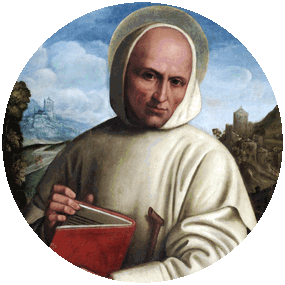
6 October
St. Bruno (1030-1101)
Priest, Founder of the Carthusian Order
Born: 1030 at Cologne, Germany
Died: 1101 at Torre, Calabria, Italy
Patron of: diabolic possession; Ruthenia
St. Bruno was born in 1030 in Cologne, Germany. He became a priest and achieved fame as a professor of theology at Rheims. He decided to leave the world and pursue a life of complete solitude and prayer. He established his hermitage in Chartreuse, near Grenoble, France. Soon he attracted disciples and he established the first monastery of Carthusian monks. Pope Urban II called him to Rome, but later Bruno was able to establish a second monastery in Italy. He died in 1101 at Calabria. This feast is celebrated today both in the Ordinary Form and the Extraordinary Form of the Roman Rite.
COLLECT PRAYER
O God, who called Saint Bruno to serve you in solitude, grant, through his intercession, that amid the changes of this world we may constantly look to you alone. Through our Lord Jesus Christ, your Son, who lives and reigns with you in the unity of the Holy Spirit, God, for ever and ever.
Things to Do:
- Find out more about Carthusian monks.
- Read more about the First Crusade and St. Bruno’s involvement; Meditate on the importance of penance and sacrifice and resolutions to make changes in one’s life — Carthusians live a severe life, but even we have a place for penance.
St. Bruno
St. Bruno, born in Cologne about 1030, was the founder of a religious Order, the Carthusians. His mother was St. Matilda, patroness of Maude, widow of King Henry I. Excepting St. Norbert, he is the only German having that honor. His contemporaries called him the light of the Church, the flower of the clergy, the glory of Germany and France. Early in life he was a canon at Cologne and Rheims. The persecution by the simoniacal archbishop of Rheims, Manasses, hastened his resolve to enter a life of solitude (1084). Legend puts it this way. A famous professor had died. While the Office of the Dead was being chanted at his funeral, he suddenly raised himself up from the coffin and said: “By the just judgment of God have I been accused, judged, damned.” Thereupon Bruno renounced the world. He received from Hugo, bishop of Grenoble, a site called Chartreuse (from the color of the surrounding hills) as a place of residence.
The Order founded by Bruno is one of the strictest in the Church. Carthusians follow the Rule of St. Benedict, but accord it a most austere interpretation; there is perpetual silence and complete abstinence from flesh meat (only bread, legumes, and water are taken for nourishment). Bruno sought to revive the ancient eremitical way of life. His Order enjoys the distinction of never becoming unfaithful to the spirit of its founder, never needing a reform. Six years after initiating the foundation, Bruno was called to Rome by Pope Urban II as personal counselor. He complied with a heavy heart. However, when the Pope was forced to flee to Campania because of Emperor Henry IV, Bruno found a wilderness similar to that of Chartreuse at La Torre; there he made a second foundation, which blossomed into a flourishing community. Here in September, 1101, he became severely ill. Having called together his followers, Bruno made a public confession and died on October 6, 1101, at the age of seventy-one.
Excerpted from The Church’s Year of Grace, Pius Parsch
Source: Catholic Culture
For a detailed account, look-up: EWTN